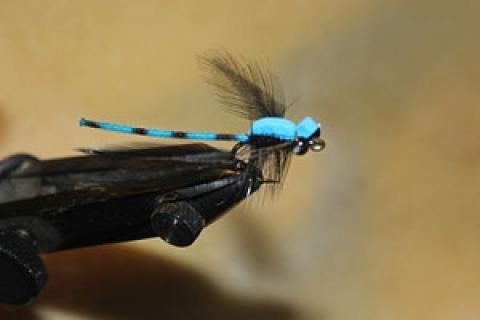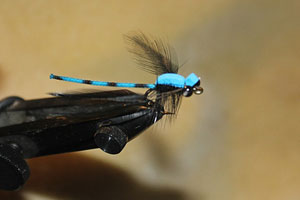
Damsel flies, for those of us that are not super knowledgeable about terrestrial insects, are smaller delicate versions of the dragon flies we see around lakes and rivers. Damsels hatch during the warm summer months (June, July and August) and hang around bodies of water feeding voraciously on other small insects.
When Damsels Work
 In most lakes and rivers that have healthy hatches of Caddis flies and Mayflies during the summer months, damsels will usually draw little attention from trout. On the other hand if you find a body of water that is not hatch heavy, then an attractor pattern like damsel dry can stir trout into a feeding frenzy.
In most lakes and rivers that have healthy hatches of Caddis flies and Mayflies during the summer months, damsels will usually draw little attention from trout. On the other hand if you find a body of water that is not hatch heavy, then an attractor pattern like damsel dry can stir trout into a feeding frenzy.
One of the most common damsel flies that you will see around your favorite rivers and lakes will be bright iridescent blue and outlined in black. The body of the fly is long and thin with delicate wings that are black. Damsel flies will hover above the waters surface looking to feed on insects and occasionally fall to the waters surface struggling helplessly. Trout will haphazardly try and feed on these damsels as they hover above the water but are really only successful when those flies touch down, and that is what you should imitate. Your fly has to be a good reproduction to fool them. Look to choose a fly that incorporates some foam into its construction so that it floats but part of it needs to sink to look like a struggling fly. I personally like flies that use blue foam for the thorax of the fly but blue micro braid for the body.
How to Fish Them
To fish these flies, cast to an area where you have seen fish feeding and let your fly sit quietly on the surface for a short period of time. Make short strips of line (1 to 2 inches at a time) interspersed with short pauses until the fly is brought out of the potential feeding zone. Since you probably will not be able to see the fish coming you have to be on guard the whole time your fly is on the water. Fish seem to just explode on your damsel out of the blue and if you do not have the line pinched taught you will not be able to set the hook in time. With lake fishing scenarios, be patient when casting to rising fish. Work the outside edges of where you see the fish feeding before casting to the hot spot because you might be able to catch a few fish on the outskirts of this area.
Having a well rounded fly box with a variety of flies can make a huge difference on your fishing success. The Damsel fly is not something that you need to use often, but is a fun fly to use to bring trout to the surface.
- 4625 views

